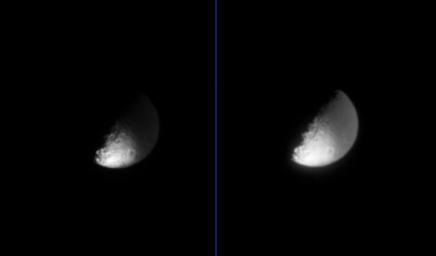
|
Iapetus: Light and Dark
- Click the image above for a larger view
- Full-Res JPEG (872 x 512) (12.4 kB)
- Full-Res TIFF (872 x 512) (114.1 kB)
Caption:
The dark material that coats one hemisphere of Saturn's moon Iapetus is very dark, as these two processed views of the same image demonstrate.
The image on the left has been cleaned of cosmic rays and magnified; in this otherwise un-enhanced view, only a small part of the moon's surface, at the bottom, is visible because it is part of the bright side of Iapetus. (Only the right hand side of Iapetus is illuminated by sunlight.) The same image, shown on the right, has been contrast-enhanced to make visible the part of the illuminated side of Iapetus that is coated with dark material.
The image was taken in visible light, with the Cassini spacecraft narrow angle camera on July 19, 2004, from a distance of 2.9 million kilometers (1.8 million miles) from Iapetus, and at a Sun-Iapetus-spacecraft, or phase angle of 89 degrees. The image scale is 17 kilometers (11 miles) per pixel. The image has been magnified by a factor of four to aid visibility.
Background Info:
The Cassini-Huygens mission is a cooperative project of NASA, the European Space Agency and the Italian Space Agency. The Jet Propulsion Laboratory, a division of the California Institute of Technology in Pasadena, manages the Cassini-Huygens mission for NASA's Office of Space Science, Washington, D.C. The Cassini orbiter and its two onboard cameras, were designed, developed and assembled at JPL. The imaging team is based at the Space Science Institute, Boulder, Colo.
For more information, about the Cassini-Huygens mission visit, http://saturn.jpl.nasa.gov and the Cassini imaging team home page, http://ciclops.org .
Cataloging Keywords:
| Name | Value | Additional Values |
|---|---|---|
| Target | Iapetus | |
| System | Saturn | |
| Target Type | Satellite | |
| Mission | Cassini-Huygens | |
| Instrument Host | Cassini Orbiter | |
| Host Type | Orbiter | |
| Instrument | Imaging Science Subsystem (ISS) | |
| Detector | Narrow Angle Camera | |
| Extra Keywords | Color, Visual | |
| Acquisition Date | ||
| Release Date | 2004-08-31 | |
| Date in Caption | 2004-07-19 | |
| Image Credit | NASA/JPL/Space Science Institute | |
| Source | photojournal.jpl.nasa.gov/catalog/PIA06466 | |
| Identifier | PIA06466 | |
